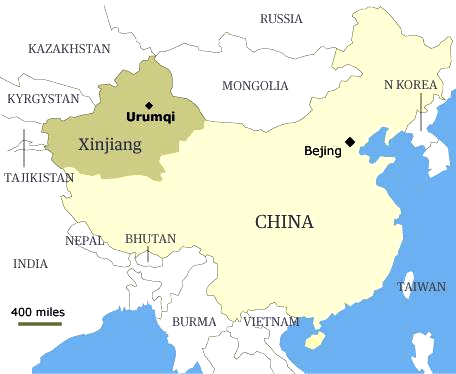Declaration for Uighur Muslims | 25 Oct 2021
Why in News
Recently, 43 countries have signed a declaration, calling on China to ensure full respect for the rule of law for the Muslim Uighur community in Xinjiang.
- Earlier, in March 2021 several hundred Uighur Muslim women in Turkey staged an International Women’s Day march against the extradition agreement of Turkey with China.
Key Points
- About the Declaration:
- The declaration was signed by the US and other countries accusing China of human rights violations and ethnic cleansing against the Uighur Muslims.
- Similar declarations in 2019 and 2020 condemned China for its policies in Xinjiang, where United States has accused Beijing of carrying out genocide.
- It also called for access to Xinjiang for independent observers, including the UN High Commissioner for Human Rights.
- It noted the existence of a large network of ‘political re-education’ camps in Xinjiang Uighur Autonomous Region, where over a million people have been arbitrarily detained.
- The declaration was signed by the US and other countries accusing China of human rights violations and ethnic cleansing against the Uighur Muslims.
- China’s Stand:
- China has long denied accusations of ethnic cleansing. It also denounced the declaration and termed it as a plot to hurt China's image.
- China claims its camps to be ‘educational centres’ where the Uighurs are being cured of “extremist thoughts” and radicalisation, and learning vocational skills.
- However, in actuality, they are brutal incarceration camps.
- India’s Stand:
- The Indian government has maintained near silence on the Uighur crisis.
Uighur Muslims
- About:
- The Uighurs are a predominantly Muslim minority Turkic ethnic group, whose origins can be traced to Central and East Asia.
- The Uighurs speak their own language, similar to Turkish, and see themselves as culturally and ethnically close to Central Asian nations.
- The Uighurs are considered to be one of the 55 officially recognized ethnic minority communities in China.
- However, China recognises the community only as a regional minority and rejects that they are an indigenous group.
- Currently, the largest population of the Uighur ethnic community lives in the Xinjiang region of China.
- A significant population of Uighurs also lives in the neighbouring Central Asian countries such as Uzbekistan, Kyrgyzstan and Kazakhstan.
- Xinjiang is technically an autonomous region within China — its largest region, rich in minerals, and sharing borders with eight countries, including India, Pakistan, Russia and Afghanistan.
- The Uighurs are a predominantly Muslim minority Turkic ethnic group, whose origins can be traced to Central and East Asia.
- Persecution of Uighurs:
- Over the past few decades, as economic prosperity has come to Xinjiang, it has brought with it in large numbers the majority Han Chinese.
- They have cornered the better jobs, and left the Uighurs feeling their livelihoods and identity were under threat.
- This led to sporadic violence, in 2009 culminating in a riot that killed 200 people, mostly Han Chinese, in the region’s capital Urumqi.
- Uighur Muslims for decades have suffered from abuses including persecution, forced detention, intense scrutiny, surveillance and even slavery.
- China claims that Uighur groups want to establish an independent state and, because of the Uighurs’ cultural ties to their neighbours, leaders fear that elements in places like Pakistan may back a separatist movement in Xinjiang.
- Over the past few decades, as economic prosperity has come to Xinjiang, it has brought with it in large numbers the majority Han Chinese.
Way Forward
- China must close its “Vocational Training Centers,” release the religious and political prisoners from prisons and detention camps.
- It should adopt multiculturalism and accept the Uighurs and other Turkic Muslims of China as ordinary citizens equal to native Chinese.
- All the countries should reconsider their position and urge China to immediately stop the persecution of Muslims and the prohibition of Islam in Xinjiang.

